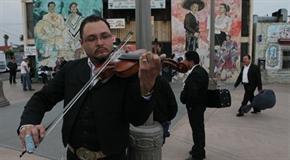LA’s Mariachis Form Union In Bid To Boost Prices
With the number of gigs plummeting by more than half over the past two years, competition has gotten so cut-throat at the square that fistfights and shouting matches have erupted as musicians underbid each other to land scarce jobs.

Now a group of veteran plaza musicians have banded together to form a type of mariachi labor union to stop what they call “mariachi pirates” from slashing prices to half the going rate.
“Mariachi is culture and it’s the way we earn our living,” said guitarist Arturo Ramirez, president of the United Mariachi Organization of Los Angeles. “We have to protect it. This is unfair competition.”
But others complain the new organization simply aims to muscle out lower-priced competitors.
“It’s unjust,” said Rafael Flores, as he stood on the curb with a guitar. “This plaza doesn’t belong to anyone. We’re all here trying to work.”
For many Mexican-Americans, birthdays, christenings and weddings aren’t complete without a traditional mariachi band, which usually comprises two types of guitars, trumpets and violins with five or six members forming a typical group.
Decked out in Mexican cowboy outfits known as “charro” suits and the iconic wide-brimmed sombreros, the mariachis play the mournful ballads of lost love and lively two-step rhythms that many grow up with.
Mariachi Plaza, in the heart of the heavily immigrant neighborhood of Boyle Heights on the edge of downtown, has been known as the place to contract a band since the 1940s. It’s now an anchor of city lore with huge colorful murals of mariachis blanketing walls and a bandstand and benches donated by the Mexican state of Jalisco, the birthplace of mariachi.
As they wait for customers, costumed musicians stroll about the square, trilling trumpets and plucking violins, or stand on the curb handing out business cards to passing motorists. The tradition of a public hiring hub comes straight from Mexico, where Mexico City and Guadalajara both have similar mariachi squares.
With as many as 400 musicians regularly frequenting the Boyle Heights plaza, a cottage industry has sprung up around it to serve them. Down the street, a shop sells musical instruments and storefront seamstresses stitch the outfits. An old hotel next to the square, now being redeveloped, for decades served as a flophouse for musicians arriving from Mexico, instrument cases in hand.
Although it’s always been competitive, in recent years the atmosphere at the plaza has gotten ugly.
As the faltering economy dried up work, more amateurs arrived hoping to earn a few bucks. They underbid the professional mariachis, who have spent years building their reputations and rely on music as their primary source of income.
Established rates are about $50 per hour per musician, said Ramirez, who heads Mariachi Los Dorados de Villa and has been working out of the plaza for 25 years. Most groups require minimums of several hours or charge for travel and setup time, as well as the performance.
But interlopers are charging as low as $150 an hour for a band – or $20-30 per hour per musician – and advertising in home-delivered flyers, so people aren’t even coming to the plaza to seek mariachis
“They’re mariachi pirates,” said Jacinto Tiznado, a union organizer who also noted that professional mariachis work as registered business and pay taxes. “They don’t even have the whole suit or know all the songs. Their artistic quality is low.”
With business bouncing back somewhat this year, a core group of musicians launched the United Mariachi Organization a couple months ago in an effort to recoup lost market share and shore up prices.
So far, about 150 members have enrolled, agreeing to charge the $50 hourly minimum, said Ramirez, who charges $350 per hour for his five-piece group.
The group charges $10 a month in dues and gives members an official ID card. The organization will also help members deal with booking agency contracts after numerous complaints of bounced checks and reneged-on prices.
For customers, hiring a union musician will ensure an authentic mariachi experience, hopefully ending gripes about performance quality from low-priced groups, Ramirez said. “People come to the plaza and complain about the band they hired,” he noted.
Eventually, the organization hopes to provide workshops for musicians to improve their craft. Many players, born into mariachi families, learned informally.
For Flores and other musicians, pricing is a function of supply and demand. Flores, who declined to say how much he charges, said he’s had to work in factories and odd jobs to make ends meet.
If customers are not willing to pay higher rates, musicians must lower theirs, he noted.
“The recession has been very hard,” Flores said. “We have to eat.”
Ramirez said he can’t force any musicians to join the organization, nor out of Mariachi Plaza, but if musicians can’t charge the going rate, he thinks they should go elsewhere to seek work.
“We’re not trying to impose anything on anybody nor are we denying work to anyone,” Ramirez said. “But this is hurting the plaza.”
 Daily Pulse
Subscribe
Daily Pulse
Subscribe

